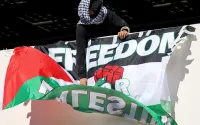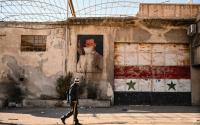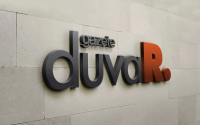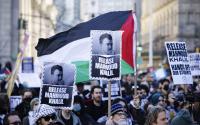17 November 2005Thom Shanker and David Stout
White House advisers convene secret sessions about the political dangers of revelations that American troops committed atrocities in the war zone, and about whether the president can delicately intervene in the investigation. In the face of an increasingly unpopular war, they wonder at the impact on support at home. The best way out of the war, they agree, is to prop up a new government that they hope can unite the fractured foreign land.
The National Archives and Records Administration on Wednesday released 50,000 pages of previously classified documents from the Nixon administration that reveal how all of that president's men wrestled with issues that eerily parallel problems facing the Bush administration.
There are many significant differences between the wars in Vietnam and in Iraq - a point that senior administration officials make at any opportunity. But in tone and content, the Nixon-era debate about the impact of that generation's war - and of war-crimes trials - on public support for the military effort and for White House domestic initiatives strikes many familiar chords.
As the Nixon administration was waging a war and trying to impose a peace in South Vietnam, it worried intensely about how the 1968 massacre at My Lai of South Vietnamese civilians by American troops would hurt the war effort, both at home and in Asia.
My Lai "could prove acutely embarrassing to the United States" and could affect the Paris peace talks, Defense Secretary Melvin R. Laird warned President Nixon. "Domestically, it will provide grist for the mills of antiwar activists," Mr. Laird said.
Documents show how the Nixon White House fretted over politics and perception, much as the Bush White House has done during the Iraq war, and that it feared that mistreatment of civilians could be ruinous to its image.
"The handling of this case to date has strictly observed the code of military justice," Henry A. Kissinger, then the national security adviser, wrote in a memo to the Nixon aide H. R. Haldeman. Mr. Kissinger said the court-martial of Lt. William L. Calley Jr., who was implicated in the massacre and ultimately convicted, would alleviate press concerns about a cover-up.
Moreover, President Nixon believed that images could be changed, as the presidential aide John R. Brown III wrote to Mr. Kissinger. "Secretary Laird's press is a measure of the good things a onetime hard-liner can earn by playing the dove for the liberal press," Mr. Brown wrote on Jan. 14, 1970.
With so many academic studies, popular histories and memoirs on the bookshelf - and more than seven million pages of Nixon documents released since 1986 by the National Archives in an ongoing declassification process - historians combing over the files on Wednesday said they were looking for golden needles in a haystack more than mining a previously unknown vein of precious metals.
The new release of documents included files on early American assessments of Israel's nuclear program, debates about supporting Pakistan during its war with India in 1971 and the superpower rivalry with Moscow.
Some of the Vietnam documents contain details about how the Nixon administration tried to prop up South Vietnam's president, Nguyen Van Thieu, behind the scenes while portraying him publicly as a courageous leader, as President Johnson had done.
In language that resonates with the positions of the Bush administration with regard to building a new government in Baghdad, the Nixon White House said in May 1969 that it wanted to establish in Vietnam "procedures for political choice that give each significant group a real opportunity to participate in the political life of the nation."
"What the United States wants for South Vietnam is not the important thing," said an internal White House planning-initiative memo. "What North Vietnam wants for South Vietnam is not the important thing. What is important is what the people of South Vietnam want for themselves."
The papers illustrate, too, how as late as 1969 American leaders really did not know very much about the psychology of North Vietnam - or, for that matter, about sentiments in the South.
In March 1969, while the Paris peace talks were under way, American officials worried about how strongly to react to a rocket attack on Saigon. Secretary of State William P. Rogers cabled American diplomats about the decision not to retaliate militarily against the North.
"Plainly, we shall need to have the most careful and continuing readings of the South Vietnamese temperature," Mr. Rogers wrote, reflecting concerns in Washington that the Saigon government would suspect it was being sold out.
Around that time, the State Department suggested that the American negotiator Henry Cabot Lodge soften his language in conveying American displeasure to the Hanoi delegation.
"We prefer this language not because it is less ambiguous than the original version but, on the contrary, because it is more ambiguous - and hence more flexible - as to our response," a State Department cable said.
That July, President Thieu fussed over Washington's editing of a speech he was to make recounting all the concessions that had been made to the Communists and calling again for general elections. A secret State Department wire to Saigon and Paris said an aide to Mr. Thieu, in describing his boss's annoyance, "used a phrase which, translated into English, comes out like 'Secretary Rogers has deflowered my speech.' "
President Nixon praised the July 11 speech as "a comprehensive, statesmanlike and eminently fair proposal for a political settlement in South Vietnam."
The documents show an internal debate in Washington over what effects the death of Ho Chi Minh, the North Vietnamese leader, in September 1969, would have.
Mr. Kissinger told the president that Ho's death would hurt North Vietnam's morale but would probably not soften its resolve. But a State Department cable to its diplomats around that time, when the department was headed by Mr. Kissinger's rival, Mr. Rogers, had a different perspective.
"We are, of course, uncertain ourselves of consequences of Ho's death," it read in part. "We are handicapped in our own analysis by paucity of good intelligence information on North Vietnamese intentions and internal politics."
During the summer and fall of 1969, a great effort was made by the Nixon White House to intervene in a military investigation of a group of Army Special Forces who had been accused of killing a suspected double agent in Nha Trang.
In a memorandum to Bryce Harlow, a Nixon aide, on Sept. 26, 1969, Mr. Kissinger counseled him about how to deal with the concerns of Congress. "The main substantive point you should make," Mr. Kissinger wrote, "is that the president is very concerned about the long-term implications of this case and that he is most anxious to dispose of it in a way which will do the least damage to our national security, the prestige and discipline of our armed services and to preserve our future freedom of action in the clandestine area."
"This is clearly a sign of things to come - and we are really going to be hit," Mr. Haldeman wrote to Mr. Kissinger, urging a quiet resolution. "Anything we can do - even at this late date?"
http://www.nytimes.com/2005/11/17/international/17nixon.html?pagewanted=1






